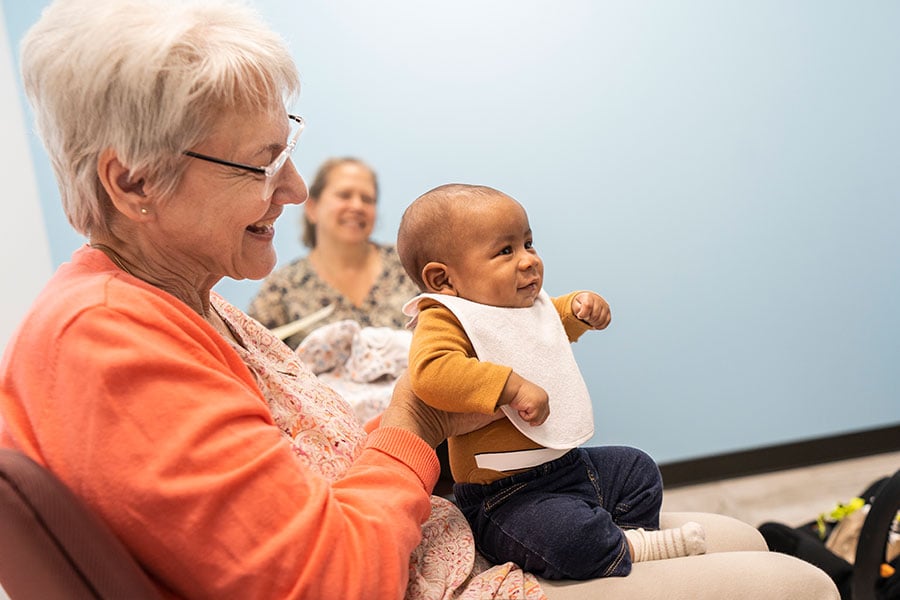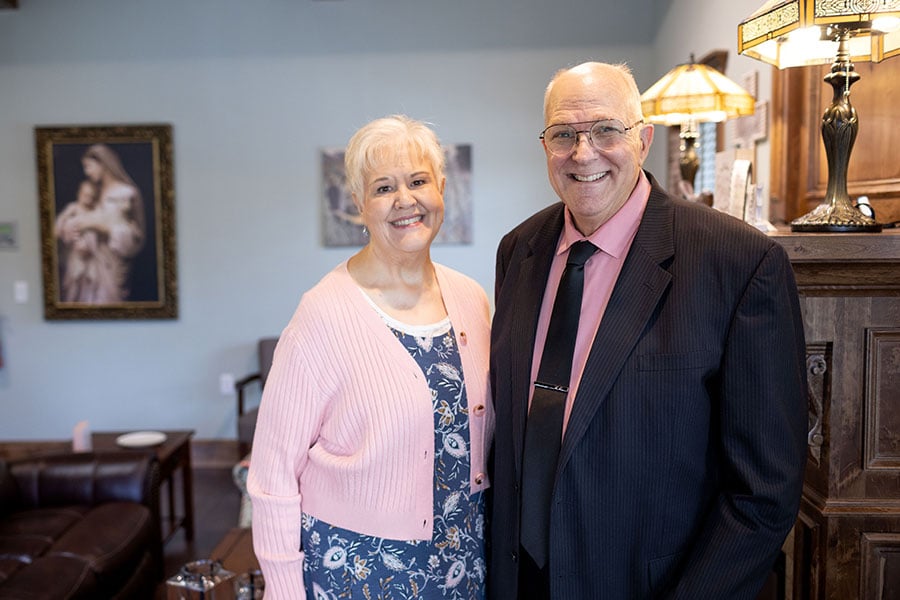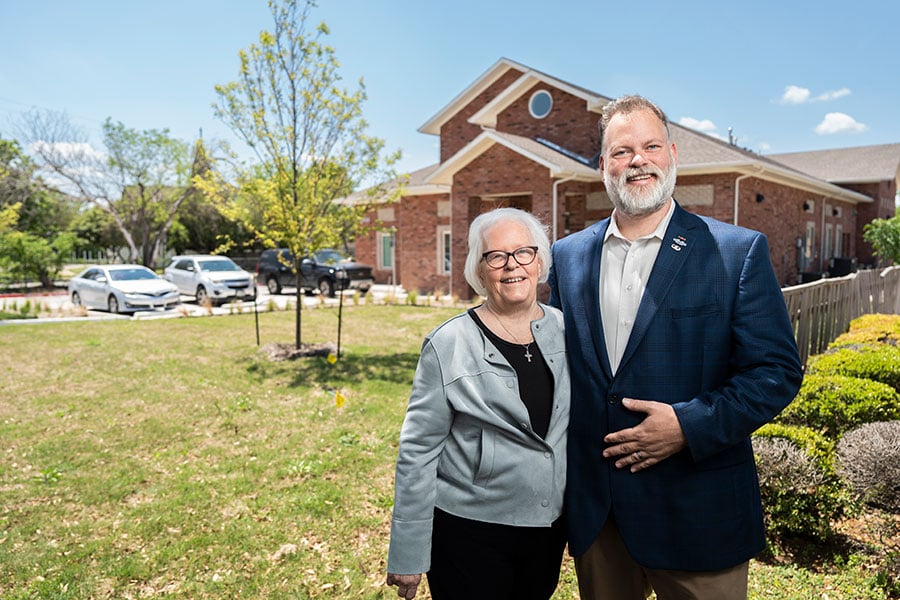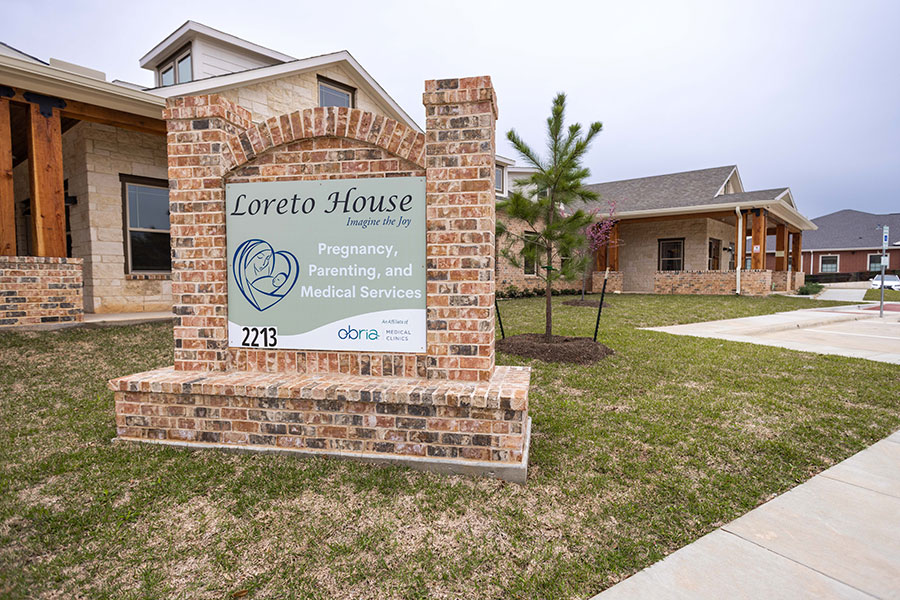Baby boom: pro-life pregnancy centers expand locations and services

Mother and Unborn Baby Care volunteer Cindy Zampardi holds 3-month-old Messiah Fearson during a client session on April 13 at the new MUBC location. (NTC/Juan Guajardo)
Pregnant? Scared? Need help?
It’s a message blanketing highway billboards across the country. And never has responding to those pointed questions been more important.
Since the first pregnancy resource center opened in 1967, the number of life-affirming organizations in the U.S. offering holistic care to women in crisis pregnancies has grown to almost 3,000. Texas has approximately 200 pregnancy centers — more than any other state.
According to the Charlotte Lozier Institute, in 2019 pregnancy health centers served roughly two million women and men with services valued at $266 million.
In the Diocese of Fort Worth, two nonprofits, Mother and Unborn Baby Care and Loreto House, have seen calls increase for emotional, material, and practical support during pregnancy since the Supreme Court, in a 5–4 decision, overturned the Roe v. Wade decision legalizing abortion in the United States.
Following the Court’s ruling, Bishop Michael Olson promised the diocese would redouble efforts to serve expectant mothers and families by caring for the prenatal and early development needs of their children through its Respect Life Office and apostolates.
“We must be mindful that at the heart of our prayers and labor is not the changing of law but the conversion of hearts toward greater gratitude, respect, and love for each human person,” he said.
Meeting that expectation, both Mother and Unborn Baby Care and Loreto House have expanded their outreach and services to help families overcome the obstacles that prompt them to seek abortion.

Becoming more visible, accessible
Photos of babies saved from abortion decorate the walls of a recently constructed Mother and Unborn Baby Care building at 3264 Lackland Road. The two-story brick structure is the new home for a ministry started in 1984 by the late Chuck Pelletier and his wife, Pat.
Every image tells a story and Pat Pelletier, the organization’s president, remembers in detail the circumstances surrounding each life rescued. One college student feared missing too much school if her pregnancy continued. Another worried about an unpaid truck loan. The mother of several young children was pressured by her husband to terminate a pregnancy because she was the family’s breadwinner.
“Some of these babies are now 35 years old,” explained Pelletier, drawing attention to a collage of smiling faces. “They are all so special to us.”
After working for 20 years from a 1,400-square-foot storefront in the hospital district, the ministry has moved into a larger, almost 6,000-square-foot space in west Fort Worth. The appealing layout features a family-friendly waiting area, counseling rooms, two sonogram stations, offices, and more storage for diapers, clothing, and formula. An oratory housing the Blessed Sacrament is planned. Designed with an upstairs conference room for large gatherings, the building benefits both the ministry and the diocese.
“It gives us more space and the location makes us more available to women,” the pro-life advocate pointed out. “And it’s good for the diocese. Forty Days for Life will use the conference room for training, and the Respect Life committee has already had a quarterly meeting here.”
Neighboring a now-closed clinic that once performed 500 abortions a month, Mother and Unborn Baby Care hopes its neutral “Pregnancy Option Center” sign will draw women to its door.
“Sixty to 65 percent of the women coming to see us want an abortion,” Pelletier said. Many visitors ask for the abortion pill which accounts for 54 percent of terminated pregnancies.
Others call the center looking for transportation to a state where abortion is legal.
“Sidewalk counselors in Wichita, Kansas, tell us the parking lot is full of cars with Texas tags,” she revealed. “They told one man about resources in Fort Worth to help him, and he got his wife out of the clinic. They’re back home and we’re going to help.”
Undertaking a construction project was a daunting but necessary challenge. Relocating to a well-traveled street and multipurpose building makes the ministry more visible and accessible.
“The whole thing is God’s mission,” Pelletier added. “The only thing that makes me feel comfortable when we’re struggling for funding is seeing God’s hand in it.”
Following in his parents’ footsteps, Jim Pelletier joined the organization as administrator and helped oversee the building process. Guided by R.J.M. Contractors — a charity-focused business — the project was completed on time and under budget.
“Everything about this is being authentically Catholic. It’s about having a mission in the most literal sense and that mission is bringing Jesus to those who are either unwelcomed or unvalued,” he said. “That’s what we’ve done for 38 years with the Blessed Sacrament.”
Everything Mother and Unborn Baby Care can provide — emotional support, sonograms, and resources — is important.
“But the real power behind all this is the real presence [of Christ],” the administrator continued.
Eighty-five to 90 percent of clients who come to the center change their minds about having an abortion.
“It’s not because we’re great counselors,” Pat Pelletier admitted. “The Holy Spirit is the one who leads the conversation.”

Helping women, transforming lives
People who wonder whether a pregnancy help center can make a real difference in the life of a woman only have to read the dozens of five-star reviews for Loreto House from grateful clients. Providing compassionate assistance and support to expectant mothers since 2007, the Denton-based apostolate now operates a medical clinic at 1100 N. Bonnie Brae Street and has opened a second location with the same services in Flower Mound.
“When the doors are closing in and you have no one to talk with, Loreto House is there to listen and do whatever they can to help.”
“I gained so much information about being pregnant and raising a baby. They supported me with baby and mother essentials.”
“This place made me feel extremely safe and comfortable while waiting for results.”
The need for a crisis pregnancy center in the north area of the diocese prompted Randy Bollig and his wife, Laurie, to open Loreto House — a ministry named for the home where, according to Catholic tradition, the Blessed Mother was conceived, was born, and experienced the Annunciation.
“Our charism comes from the Holy Family — the perfect model for today’s families,” said Bollig, executive director. “Women can come to us knowing they will be treated with full dignity and in accord with our faith.”
There’s no judgment or proselytizing.
“We serve without trying to convert, and we emulate the Blessed Mother,” he explained. “That’s why we’re so successful. We’re living our faith by action.”
Requests for assistance increased dramatically last year when Texas banned abortions following the demise of Roe v. Wade. Loreto House now serves 50 to 60 women a day and organizers believe the new Flower Mound location will equal that.
The craftsman-style building at 2213 Acropolis Drive houses two exam rooms, a nurse’s station, a lab, seven ADA-compliant bathrooms, spaces for quiet conversations, a private oratory, and a large parking lot.
“All those things we’ve been doing for the past 15 years will continue there,” Bollig assured. “We serve women during their pregnancy and up to 36 months after the baby is born with support, classes, and material goods. We walk with women for quite a long time and the addition of a medical clinic extends that.”
Affiliated with the Obria medical group, Loreto House began offering well-woman exams, first trimester prenatal care, STD testing and treatment, and cancer screenings along with other services in February.
“There’s a great need for women to get quality health care,” said Tracy DuBois, director of medical services for both locations. “With many OB/GYNs in Denton retiring, moving, or not accepting Medicaid, we recognized a gap we could fill.”
The clinic accepts insurance and payment plans.

“We serve everyone. No one is turned away. If someone can’t afford our services, we work with them,” DuBois stated decisively. “It’s about carrying out the same compassionate services we offer on our advocate side.”
An advocate is the person a Loreto House client meets first.
“Whether it’s resources, material goods, pregnancy tests, or clinic referrals, we’re the ones who hold their hand throughout the whole pregnancy or parenting process,” said Nicole Ellis, a volunteer who visits with four or five clients a day. “We also do classes with them.”
Mothers who turn to Loreto House for help come from varied backgrounds. Most are single but some are married and struggling financially. Domestic violence and other issues are often part of the narrative.
Ellis, a St. Mark parishioner in Argyle, works at the new Flower Mound location where the list for appointments is already growing.
“We’re here to serve everyone, moms and dads, no matter what the situation,” she emphasized. “We care about the whole family unit.”
Randy Bollig invites North Texas Catholics to visit Loreto House, where they can imagine the joy of welcoming new life into the world. The former home builder and real estate agent promised, “It will open your eyes.”
“A lot of people think we’re just a pregnancy care center giving out diapers. We do much more,” asserted the founder who describes what happens at Loreto House as transformative.
Facing an unexpected pregnancy, a woman will often walk through the door tearful and fearful.
“When she leaves an hour later, she’s hugging the advocate and crying tears of joy,” Bollig said. “That’s a privilege I get to see a lot.”
